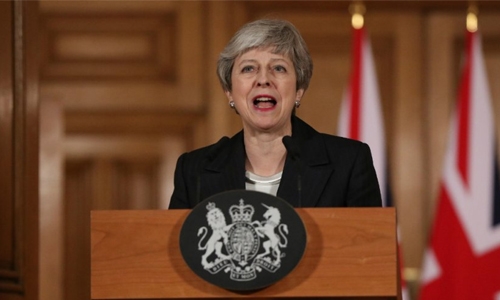May makes fresh push for Brexit
British Prime Minister Theresa May huddled with her ministers yesterday as she plotted a renewed bid to convince MPs to back her EU divorce deal after securing a delay to Brexit from European leaders in Brussels. The premier faces daunting odds to persuade British lawmakers to support a plan they have already overwhelmingly rejected twice by a new April 12 deadline agreed with the European Union.
If May succeeds, Britain -- which was staring at a cliffedge deadline of March 29 for leaving the EU -- will depart on May 22 under the terms of a withdrawal agreement struck with the EU last year. But if MPs defeat the accord again next week Brexit will go ahead on April 12, unless London decides to request another extension. A further extension would require Britain to take part in elections for the European Parliament in May despite having voted three years ago to leave the bloc.
“Until April 12, anything is possible,” EU Council President Donald Tusk told reporters on Friday at the close of the EU summit in Brussels. German Chancellor Angela Merkel said the bloc’s leaders would need another summit with May to discuss how to proceed if MPs reject the agreement again.
“I will make every effort to ensure that we are able to leave with a deal and move our country forward,” May said on Thursday. The pound rose on news of the delay but is likely to remain volatile amid uncertainty over what path Britain will now take.
‘Short periods of time’
Tusk said four options were possible: a deal, a long extension “if the UK decided to rethink its strategy”, a no-deal exit or revoking Article 50 -- the formal procedure for member states to leave the EU. He said April 12 is now a “key date” -- because after that Britain could no longer register candidates for the European Parliament elections. “If it has not decided to do so by then, the option of a long extension will automatically become impossible,” Tusk said.
The British government declined Friday to set a date for a third parliamentary vote on the divorce deal but said it hoped it would happen next week. She faces an immediate hurdle in the form of parliamentary speaker John Bercow. He has said the agreement being voted on has to be on different terms from the ones MPs have already rejected.
There was also heightened speculation that May is increasingly open to a series of so-called “indicative votes” that could show what option parliament prefers. “In the event of the House (of Commons) voting down the meaningful vote, it would not be unreasonable to have subsequent votes to find out what the House actually supported,” junior Brexit minister Kwasi Kwarteng told MPs.
Related Posts

